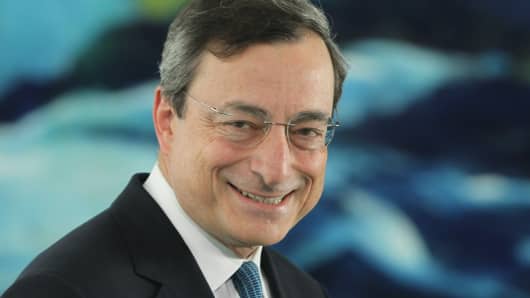In his press conference, Draghi cited Europe's relatively low corporate and household debt, high savings ratios and falling unit labor costs and said the region was well placed for a recovery.
"Both the euro area as a whole and the individual countries forming the euro...have a fundamental position which is way more balanced than the U.S. but also other countries, Japan or the U.K.," Draghi said.
"The fiscal consolidation that has taken place all over the euro area is amazing and when we look at the other parts of the world it's not so amazing at all," he added.
Debt-to-GDP ratios were on their way down, even in countries with the highest debt levels, he said.
"All this basically poises the euro area for a recovery which... probably is going to be slow. Probably it's going to be gradual but it's also going to be solid," Draghi said.
The European Commission on Wednesday sharply cut its forecasts for growth in the euro zone and recent data showed that the crisis was now starting to affect Germany, which has so far remained resilient to the economic downturn.
"I think we're heading for a severe recession in the economic area of the 17 counties. We may see a contraction of up to 1.5 percent in 2013 and I would say becoming even more severe in 2014," Thorsten Polleit, chief economist at Degussa Goldhandel told CNBC.
Polleit believes the ECB will have no choice but to cut rates before 2013 in a desperate effort to boost the struggling economy.
"I think in December they're going to cut interest rates by 50 basis points and so interest rates at the short end will be basically zero in nominal terms and negative in real terms," he said.
Draghi said there was clear evidence that consolidation efforts in euro area countries were bearing fruit, adding it was crucial that efforts were maintained to restore sound fiscal positions.
"Full compliance with the enforced EU fiscal and governance framework including the rapid implementation of the fiscal compact would send a strong signal to markets and strengthen confidence in the soundness of public finances," he said.
Spain remains one of the biggest concerns for ECB policymakers. Draghi declined to comment on whether he would like Spain to request aid through a new bond-buying program, known as Outright Monetary Transactions (OMT).
He said it was up to Spain to decide whether it wanted to request aid, not the ECB.
"It is entirely in the hands of government," Draghi said.
Draghi unveiled the program in September to address what he said were "severe distortions" in sovereign bond markets. The high yields some heavily indebted countries face to finance their debt have exacerbated Europe's debt crisis.
But the scheme, created to ease Spain's troubles in particular, remains to be kicked into action.
It is only activated once a country applies, and it comes with strings attached.
The country in question must meet strict conditions set by the ECB, including enacting austerity and cutting budget deficits.
Those conditions mean that Spain has so far been reluctant to ask for help.



